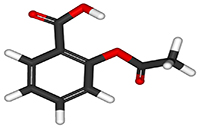Women in their first trimester of pregnancy should avoid certain cosmetics, cleaning agents and medicines to help protect the developing fetal brain from chemicals that can trigger autism, York University health researchers have found.
Prenatal brain development undergoes constant changes and its normal functioning depends greatly on the presence of specific genes at any given time. Since environmental factors influence the expression of these critical genes, it is important for expectant mothers to be aware of potential exposure to these factors, say the researchers.

“The products that we use on a daily basis, such as creams and cosmetics, contain chemicals that could potentially affect a developing baby during pregnancy,” says York University Professor Dorota Crawford in the School of Kinesiology & Health Science, Faculty of Health.
The list of items containing potentially harmful chemicals is long, including: cleaning solvents; pesticides; nonsteroidal anti-inflammatory drugs, such as acetylsalicylic acid; misoprostol, a drug used for inducing labour; polychlorinated bisphenyls used as industrial lubricants; polybrominated diphenyl ethers found in wood and textiles; and phthalates in PVC flooring, children’s toys, cosmetics and lotions.
Crawford, along with ChristineWong and Joshua Wais, authored the review article “Prenatal exposure to common environmental factors affects brain lipids and increases risk of developing autism spectrum disorders,” which was recently published in the European Journal of Neuroscience.

In the article, they summarize existing research on environmental agents that can affect the level of important lipid mediators, including prostaglandin E2 or PGE2. This major lipid molecule naturally found in the brain is important in regulating the expression of essential genes required for early brain development and its proper function.
They also report that aside from the type of chemical a pregnant woman is exposed to, the duration, frequency and concentration of the exposure can also impact a developing fetal brain.
Crawford says only a few clinical studies have delved into the dosage level and exposure time that affects the developing brain.
“Specific concentration ranges for chemicals and the duration of exposure in humans still need to be established through research,” she says.
Investigation into molecular mechanisms that lead to how these chemicals disrupt the growing brain, and also how the chemicals enter the fetal brain, will be crucial in understanding how they might contribute to brain pathologies, according to Crawford.
Assessment information on harmful chemicals can be found in the Integrated Risk Information System (IRIS) database maintained by the U.S. Environmental Protection Agency.


